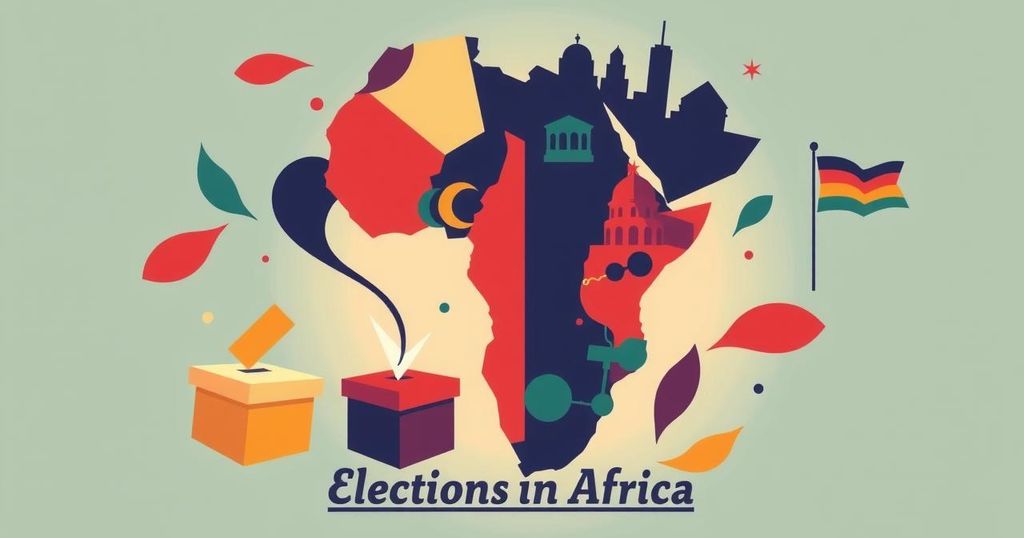In 2025, several African nations will participate in crucial elections, including nine presidential, seven legislative, and additional senatorial contests. Key elections include those in Gabon, Malawi, Seychelles, and Ivory Coast, among others. This significant electoral period will shape the future of governance and political stability across the continent.
In 2025, Africa is poised for a significant election year, with multiple nations scheduled to participate in various electoral processes. These elections will include at least nine presidential races, seven legislative elections, two senatorial contests, two municipal elections, and a couple of referendums.
Gabon will conduct presidential elections on April 12, following the approval of a new Constitution by referendum in November. This follows a military coup that led to General Brice Oligui Nguema assuming power; he is expected to contend in the elections.
Burundi is set for legislative elections on June 5 and senatorial elections on July 23, with the ruling CNDD-FDD party holding a majority in the National Assembly. The country has been under the leadership of President Evariste Ndayishimiye since 2020.
Malawi will hold both presidential and legislative elections on September 16, where President Lazarus Chakwera seeks re-election. Preliminary estimates indicate that approximately 2.5 million out of a population of 21.7 million are eligible voters.
Seychelles plans to hold its elections on September 27, with President Wavel Ramkalawan also announcing his candidacy for re-election. The ruling party currently has a majority in the National Assembly, which consists of 35 seats.
Guinea’s transitional president, Mamadi Doumbouya, announced a return to constitutional order by late 2025, starting with a referendum followed by general elections. This marks a significant shift following the coup in 2021.
In October, Cameroon and Ivory Coast are set for presidential elections, with long-standing incumbents expected to run for additional terms. President Paul Biya of Cameroon and President Alassane Ouattara of Ivory Coast have both indicated intentions to seek re-election.
Tanzania will also participate in presidential elections in October, where President Samia Suluhu Hassan is expected to run for office. She took over the presidency in 2021 after the passing of her predecessor.
Guinea-Bissau intends to hold simultaneous legislative and presidential elections between October 23 and November 25. President Umaro Sissoco Embalo has been in power since 2020, and the National Assembly has recently held elections.
The Central African Republic will conduct presidential elections in December, though it remains unclear if President Faustin-Archange Touadera will seek a third term. The region faces political uncertainty with numerous candidates potentially joining the race.
Additionally, Togo will hold its first-ever senatorial elections on February 15, marking a transition to a parliamentary system. Meanwhile, Comoros has already begun its electoral process with legislative elections on January 12 and follow-up elections scheduled.
Overall, these elections signify a critical period for various African nations as they navigate political challenges and leadership transitions, impacting their future governance and stability.
The elections scheduled in various African nations reflect a critical juncture in the continent’s political landscape. With numerous countries preparing to solidify their governance structures through legitimate electoral processes, these events will greatly influence the democratic trajectory of each nation. The context of previous military coups, constitutional reforms, and lingering political tensions further heightens the significance of these elections. The outcomes will likely affect governance, international relations, and stability across the continent.
In conclusion, the 2025 election cycle in Africa represents a pivotal moment for many nations facing leadership transitions and governance challenges. With key figures expected to run for re-election amid changing political landscapes, these elections provide an opportunity for citizens to voice their preferences and influence their respective countries’ future directions. The anticipated electoral contests will play a crucial role in shaping both national and regional stability moving forward.
Original Source: www.aa.com.tr






